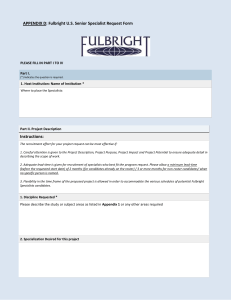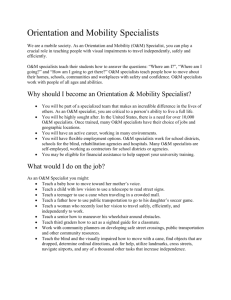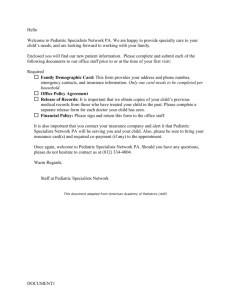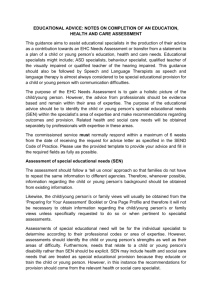Debt Collections Standards in India
advertisement
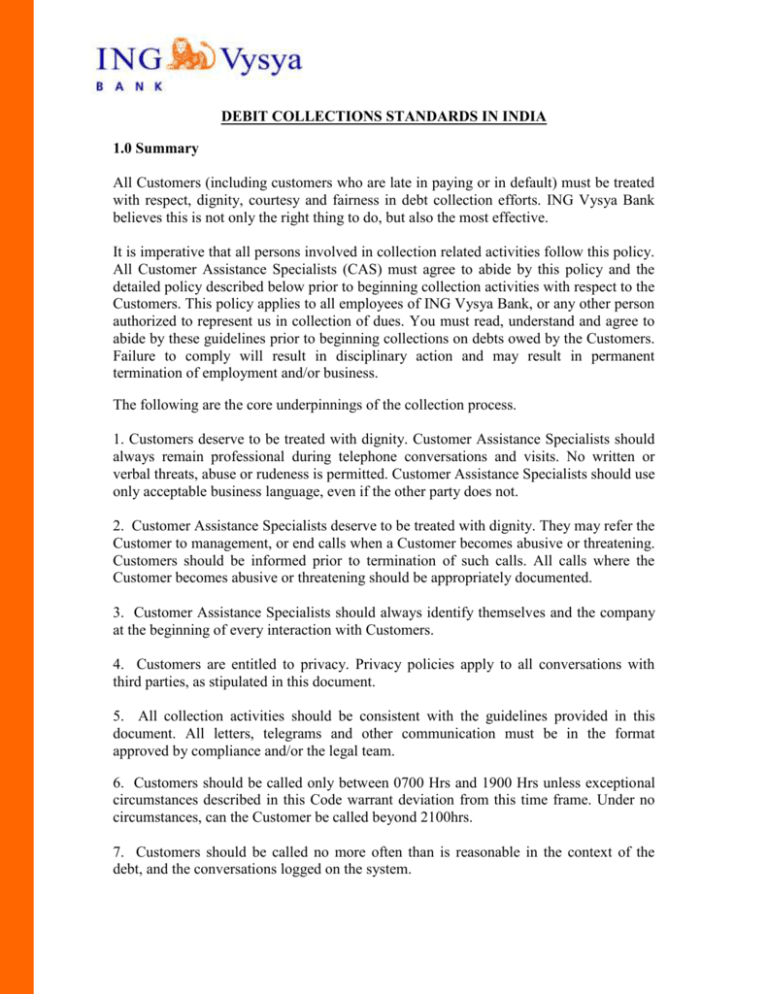
DEBIT COLLECTIONS STANDARDS IN INDIA 1.0 Summary All Customers (including customers who are late in paying or in default) must be treated with respect, dignity, courtesy and fairness in debt collection efforts. ING Vysya Bank believes this is not only the right thing to do, but also the most effective. It is imperative that all persons involved in collection related activities follow this policy. All Customer Assistance Specialists (CAS) must agree to abide by this policy and the detailed policy described below prior to beginning collection activities with respect to the Customers. This policy applies to all employees of ING Vysya Bank, or any other person authorized to represent us in collection of dues. You must read, understand and agree to abide by these guidelines prior to beginning collections on debts owed by the Customers. Failure to comply will result in disciplinary action and may result in permanent termination of employment and/or business. The following are the core underpinnings of the collection process. 1. Customers deserve to be treated with dignity. Customer Assistance Specialists should always remain professional during telephone conversations and visits. No written or verbal threats, abuse or rudeness is permitted. Customer Assistance Specialists should use only acceptable business language, even if the other party does not. 2. Customer Assistance Specialists deserve to be treated with dignity. They may refer the Customer to management, or end calls when a Customer becomes abusive or threatening. Customers should be informed prior to termination of such calls. All calls where the Customer becomes abusive or threatening should be appropriately documented. 3. Customer Assistance Specialists should always identify themselves and the company at the beginning of every interaction with Customers. 4. Customers are entitled to privacy. Privacy policies apply to all conversations with third parties, as stipulated in this document. 5. All collection activities should be consistent with the guidelines provided in this document. All letters, telegrams and other communication must be in the format approved by compliance and/or the legal team. 6. Customers should be called only between 0700 Hrs and 1900 Hrs unless exceptional circumstances described in this Code warrant deviation from this time frame. Under no circumstances, can the Customer be called beyond 2100hrs. 7. Customers should be called no more often than is reasonable in the context of the debt, and the conversations logged on the system. 8. Customer requests that calls/visits to place of work be stopped are to be honored if he/she provides a suitable alternative where he/she may be reached during collection working hours. Such Customers should be asked to provide an alternate address/phone number where they may be reached. 9. Customer’s questions should be answered in full. They should be provided with information requested, given assistance and issues resolved. Accounts with unresolved issues are to be escalated to management. 10. Customer or third party requests for supervisor names or requests to speak to the supervisor should always be honored. 11. Customer Assistance Specialist notes on the collection system should be clear, concise, accurate and free of editorial comments. All attempts, contacts, conversation and actions are to be noted on the collection system. 2.0 Why you may contact a customer? A Customer is to be contacted for debt collection only under the following circumstances: • When not doing so may impose an additional cost on the Customer or may impact the Customer’s credit history/rating – e.g. Customer spending pattern indicates that the Customer may be about to breach his/her credit line; • When the Customer has not paid on payment date (including grace days) and this is likely to impact the Customer’s credit history and/or is likely to cause a financial loss the Bank. 3.0 When you may contact a Customer? It has been our that individuals with full-time employment routinely are awake by 06:00 Hrs in order to be at their jobs at the time required. Accordingly calls must normally be limited from 0700 Hrs to 1900 Hrs. A Customer may be contacted beyond 1900 Hrs till 2100 Hrs on: 1. Phone, if repeated attempts to contact first time defaulting Customers between 0700 Hrs and 1900 Hrs in the past 48 hours have not yielded any contacts. 2. Personal visit (post 1900 Hrs and before 2100 Hrs), if a first time defaulting Customer has been non-contactable during two consecutive visits. A Customer may be contacted at a time when the call is not expected to inconvenience him/her. In addition, if a mobile number is called and the Customer is driving, then the call may be discontinued, in the interest of safety. Calls either earlier or later than normal hours, while effective in contacting the Customer, are also likely to be inconvenient to the Customer and could be viewed as harassment. Calls earlier or later than the prescribed time may be placed only under the following conditions: • When the Customer has expressly to do so either in writing or orally. • When attempts to contact the Customer have resulted in information that the Customer is normally only available outside these hours and no alternate telephone number is available to contact the Customer. • When due to nature of Customer’s employment i.e. working in shifts e.g.: Call enters, Hotels etc, he/she is usually available outside these hours. 3.1 Where you may contact the Customer The first visit to contact the Customer should be at his place of residence/ mobile. However, other telephone numbers like employment may be used. When the Collection Unit is unable to contact the Customer at his residence/ mobile, the Customer may be contacted at his/her other address or number/through borrower or referee or guarantor. In addition, automated systems that choose the best time and best number to attempt to contact the Customer may be used. 4.0 Which language should we use in the interaction? A Customer Assistance Specialist should try and use the language with which the Customer is comfortable. The Customer Assistance Specialist must not attempt to force the Customer to speak in English if he/she is not comfortable. This may be offensive to some Customers. If the Customer Assistance Specialist is not comfortable with the language spoken by the Customer, the Account may be referred to another Customer Assistance Specialist or the conversation should be continued in English/alternate language explaining the reason to the Customer. If the Customer expresses his inability to understand, the call must be referred to a supervisor. 4.1 What mode of address is to be used? Customer Assistance Specialist should use the formal mode of address in the language of choice of the customer. Customers deserve to be treated with dignity. Accordingly, Customer Assistance Specialists must be professional. As the situation requires, they may also be assertive and firm. In any event, courtesy and respect are mandatory. Customer Assistance Specialists may not become abusive, visibly irritated or demean the customer in any fashion. 4.2 How often should the Customer be called? The purpose of a collection call is to bring to the Customer’s notice the obligation and to seek a commitment to pay on a specified date. Once a promise is elicited, a call may be made to serve as a reminder and for confirmation of payment. In the event a commitment is not forthcoming or has been broken, calls may be made at reasonable frequency, based on amount owed, product, aging of debt and Account history. Excessive number of calls or calls closely bunched together in the same day may be construed as harassment. 5.0 Can the Customer’s debt obligation be discussed with anybody else? ING Vysya Bank respects a Customer’s privacy. The Customer’s debt/obligation may normally be discussed only with the Customer and co- borrower/supplementary Cardholder. In certain cases the Customer may specifically authorize us in writing to discuss the Customer’s debt with a particular third party, such authorization should be recorded on the collection system as and when the Customer provides it. In such a scenario, where a record of such permission is available on our collection system and the status card, we may leave a message/disclose/receive payment from such third party specifically authorized by the customer. However, we will not attempt to collect from this third party. This will not become a collections call. As per the Terms and Conditions, Customer debt details can be discussed with Regulatory/Law enforcement agencies as well as third party service providers who are contracted with to provide debt collection and support services. Customer Assistance Specialists may always communicate with a third party about the Customer’s debt when and to the extent doing so is necessary to enforce a decree obtained in a lawsuit against the Customer. In addition, in certain circumstances, as explained below, it may be necessary to discuss some parts of the past due obligation with related third parties. 5.1 Leaving messages and contacting persons other than the Customer at the telephone numbers/addresses provided by the borrower or made available to us as a result of trying to contact borrower. Calls must first be placed to the Customer. In the event of the Customer not being available, a message may be left for the Customer to an adult family member. The aim of the message should be to get the Customer to return the call. Ordinarily, the message text should be restricted to: Please leave a message that XXXXX (Name of officer) from XXXXX called and request him to call us back at ZZZZZZ (phone number). As a general matter, the message must not indicate: That the Customer is overdue on his/her obligation; or That the call originates from the Collection Unit. Leaving Message criterion for Credit Card: If the Customer has not responded to at least one prior message in the format mentioned above AND Account is more than 15 DPD, then it is permissible in follow-up calls (placed at Customer specified telephone number/address) to include: i) The fact that the call pertains to a Credit Card/other obligation of the customer. ii) To state/indicate that the Customer is overdue on his Card account. iii) To state/indicate the amount due and requesting for a payment to be made by the Customer. However, under no circumstance can any third party be asked to make a payment. 5.2 Leaving messages and contacting the third party - For Customers not available at the provided telephone numbers/addresses. The following approach is adopted, in the situations mentioned below, where the messages may be left at telephone number/address with an adult family member. Message is on telephone number/address other than those provided by the Customer. Customer Assistance Specialists may communicate with third parties to obtain Customer’s location information - home address, business address, home phone number and workplace phone number. This may be done when the Customer’s present location is either unknown or uncertain or the Customer is not contactable or a skip. While obtaining such information the Customer Assistance Specialist must clearly identify himself/herself. In specific cases where it may be difficult to obtain information from third parties regarding Customer’s whereabouts by identifying the organization along with the name, the Customer Assistance Specialist may choose not to mention the organization name while identifying himself/herself, unless specifically asked for the same. 6.0 No misleading statements/misrepresentation are permitted. Customer Assistance Specialists should not •Mislead the Customer on the action proposed and consequences thereof •Mislead the customer about their true business or organization name, or falsely represent or imply that the Customer Assistance Specialist is an attorney (lawyer), government official, officer of any court etc. • Threaten with imprisonment or even mention imprisonment unless legal action planned or currently underway could result in imprisonment; • Threaten with arrest/detention by the police unless, prima facie, the Customer’s actions indicate criminal intent that could lead the police to arrest/detain 6.1 Gifts or bribes Customer Assistance Specialists deserve to be treated with dignity. They should refer to management or end calls when the Customer or third party is abusive or threatening. Customer Assistance Specialists should inform the Customer that the call would be terminated prior to ending the call. All calls, where Customer becomes abusive or threatening should be documented on the collection system and reported to management. Customer Assistance Specialists may not accept gifts from Customers or bribes of any kind. Any Customer Assistance Specialist offered a bribe or payment of any kind by a Customer must report the offer to his/her management. 7.0 Precautions to be taken on visits: Residence Customer Assistance Specialists should: Respect personal space – maintain adequate distance Not enter the Customer’s residence against his/her wishes or when they are told the Customer is not at home Not restrict the Customer’s movement or restrain him/her from entering or leaving the house/room Not remain in the Customer’s house if he/she were to leave for any reason including to collect money from a bank/elsewhere Respect the Customer’s privacy – do not embarrass the customer in the presence of his/her neighbors Not make visits to the Customer’s residence if the Customer; – Expressly forbids in writing, such visits and provides suitable alternate address where he/she is contactable during collections working hours; – Has suffered a bereavement, or a Customer’s family member is gravely ill; – A social engagement is in progress. If the Customer is not present and only minors/elderly/infirm are present at the time of the visit, the Customer Assistance Specialist should end the visit with a request that the Customer call back. He should not enter the house unless invited. He should not wait for the Customer in the Customer’s residence unless specifically asked to do so by the Customer or family. Workplace Customer Assistance Specialist should: • Not visit the Customer in the office unless: – The Customer has specifically requested the CAS to do so – The Customer’s mailing address is that of the workplace; • Respect personal space; do not restrict the Customer’s movement. 7.1 What is to be done if the Customer requests us to stop visiting at the office? In such a case, the Customer should be asked to provide an alternate location where the meeting can take place during the working hours of the Collections Unit. However, if the Customer is not available at this location and attempts have been made to contact the Customer, the Customer may be contacted at his/her office again. 7.2 A Customer Assistance Specialists should not: • Offer to assist the Customer by driving him/her to the bank/any other spot from where money to repay the debt can be collected. • Have discussions of a personal nature with the Customer – maintain a professional distance. Restrict conversation to the debt owed and the Customer’s proposed repayment plan. • Use means that are unfair, for example; – Collect sums in excess of total debt of the customer – Threaten to take extra judicial action (e.g. physical threat or any unlawful action) to expropriate and dispose of Customer assets when no such right exists – Apply payments to other Accounts than those indicated by the Customer. 8.0 What is to be done if the Customer declines to pay? If the Customer declines to pay, the consequences of such a decision are to be explained to him/her: • Impact on credit history • Possible inclusion in negative list of Master Card/Indian Bankers Association • Possible legal action and its impact • Cost of defending legal action, if such action is contemplated. Should the Customer refuse to pay on the Account, then such Accounts must be referred to the Supervisor. The Supervisor shall, after discussing with the Agency Manager allocate the Account appropriately. Further calls on the Customer who communicates in writing his/her refusal to pay may follow an escalation matrix as below: • Agency Manager • Unit Head • Regional Collection Head • Country Collection Head 9.0 What is to be done if the Customer disputes the debt? The Account must be referred to the Customer Service Unit for resolution of the dispute through the Supervisor. In the event, the Customer disputes only a part of the debt, collection calling may continue for the remainder. 10.0 Other important aspects - appearance & dress code: Customer Assistance Specialists must be appropriately dressed; For men, this means – Trouser – Shirt, – Well-groomed appearance For women, this means – Well-groomed appearance.

